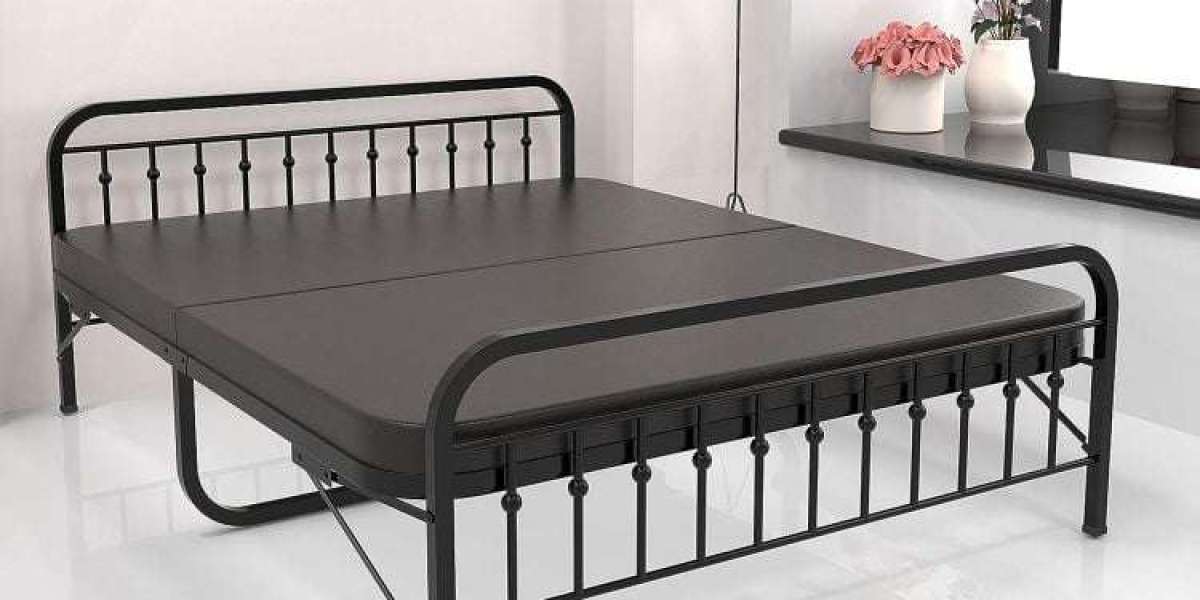When it comes to choosing the right bed for your home, the options are vast and varied. However, two of the most common choices people consider today are folding beds and traditional beds. Both serve the same primary function—providing a place to sleep—but they differ significantly in terms of design, flexibility, and how well they suit different lifestyles.
In today’s fast-paced, space-conscious world, your choice of furniture can greatly affect your comfort and convenience. So, how do you decide whether a folding bed or a traditional bed is the better option for you? Let’s dive deep into the pros, cons, and use-cases of each to help you make the right decision.
What is a Folding Bed?
A folding bed, also known as a foldable bed, is a portable, space-saving bed that can be folded up and stored away when not in use. It usually comes with a lightweight frame, often made of metal, and a mattress that is either built-in or removable.
Modern foldable beds have come a long way in terms of design, comfort, and utility. They’re perfect for homes where space is a constraint, or for people who frequently host guests.
What is a Traditional Bed?
A traditional bed is a fixed, often permanent, piece of furniture designed for regular and long-term use. These beds come in various materials such as wood, metal, or upholstered frames and usually require more floor space. Traditional beds are known for their durability, aesthetic appeal, and comfort.
1. Space-Saving Capabilities
Folding Bed:
This is where a folding bed shines the most. Ideal for small apartments, studio flats, or guest rooms, foldable beds can be tucked away after use. Some even come with wheels or storage compartments, making them highly practical in limited spaces. If you live in a metro city where space is a luxury, a folding bed is your best friend.
Traditional Bed:
A traditional bed occupies a fixed space in your room. While it may offer under-bed storage, it doesn’t allow the same flexibility as a foldable bed. If you have ample space and a dedicated bedroom, a traditional bed can work well.
2. Comfort and Support
Folding Bed:
Comfort levels for folding beds have significantly improved with modern designs. Some come with high-density foam or even memory foam mattresses. However, they might not be as supportive as a high-end traditional bed, especially for people with back issues or specific orthopedic needs.
Traditional Bed:
Generally, traditional beds offer superior comfort and support, particularly because you can pair them with any mattress of your choice—memory foam, spring, latex, or hybrid. For long-term and daily use, they are usually the preferred option for optimal sleep quality.
3. Durability and Longevity
Folding Bed:
Foldable beds are built for convenience and may not last as long as traditional beds, especially if used daily. The joints and folding mechanisms can wear out over time. However, with proper care and occasional use (like for guests), a folding bed can last several years.
Traditional Bed:
Made from solid wood or metal, traditional beds are designed for long-term use. They are sturdier and can easily last over a decade with minimal maintenance, making them a more durable investment.
4. Aesthetic Appeal
Folding Bed:
While functionality is its strong suit, a folding bed may not be as visually appealing as a traditional bed. However, modern designs have started focusing more on style, with options that blend into your decor as a sleek cabinet or bench when folded.
Traditional Bed:
Traditional beds come in a wide variety of styles, finishes, and headboard designs, offering much more in terms of visual appeal. If aesthetics play a big role in your home décor decisions, a traditional bed will likely win your heart.
5. Portability and Flexibility
Folding Bed:
Folding beds are highly portable. You can easily move them from one room to another or even carry them on road trips. Some foldable beds can be collapsed and stored in closets or under existing furniture. This makes them perfect for people who move homes frequently or live in shared accommodations.
Traditional Bed:
Traditional beds are heavy and difficult to move. Once placed, they typically stay in the same position for years. If you move frequently or enjoy rearranging your interiors often, this might be a downside.
6. Cost and Affordability
Folding Bed:
Folding beds are generally more affordable than traditional beds. They are a great option for budget-conscious buyers, students, or individuals setting up temporary accommodations. Despite their lower cost, many foldable beds still offer good comfort and durability for the price.
Traditional Bed:
Traditional beds can range from moderately priced to very expensive, depending on the material and craftsmanship. While they are an investment, the higher cost usually reflects better longevity and comfort.
7. Use-Cases: Who Should Choose What?
Choose a Folding Bed If:
You live in a compact space or studio apartment.
You need a guest bed that can be stored away.
You prefer furniture that’s portable and easy to move.
You’re looking for a budget-friendly sleeping solution.
You live in a rental or frequently relocate.
Choose a Traditional Bed If:
You have a dedicated bedroom with ample space.
You need long-term durability and support.
You value aesthetic appeal and interior design.
You want customizable mattress options.
You're setting up your forever home or planning a long stay.
Conclusion
So, folding bed vs traditional bed—which one is right for you? The answer depends entirely on your lifestyle, space, and specific needs. If convenience, portability, and space-saving are your priorities, a foldable bed is the clear winner. On the other hand, if comfort, longevity, and style matter more, a traditional bed is your best bet.
Both options have their own set of advantages, and in many cases, having both in your home can be a smart move. You can enjoy the luxurious comfort of a traditional bed in your bedroom and keep a foldable bed handy for guests or emergencies.
At the end of the day, the perfect bed isn’t just about where you sleep—it’s about how well it fits into your life.



